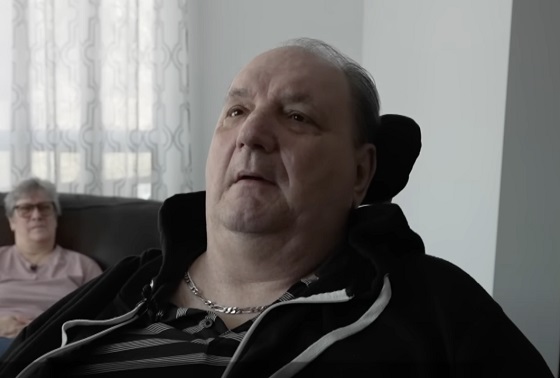Health
Quadriplegic man dies via euthanasia after developing bed sores waiting at Quebec hospital

66-year-old Quebec man Normand Meunier who died via euthanasia after a 4-day hospital stay left him with severe bed sores
From LifeSiteNews
‘I don’t want to be a burden,’ the 66-year-old man said prior to his death after he developed bed sores due to a lack of specialized care at a hospital in Saint-Jérôme, Quebec.
A quadriplegic man in Quebec was killed via euthanasia after he developed severe bed sores while waiting in a hospital for an extended period of time.
On March 29, Normand Meunier, a 66-year-old quadriplegic man in Quebec, was euthanized in his home after developing bed sores due to a lack of specialized care at the hospital in Saint-Jérôme, Quebec, according to a report by Radio-Canada.
“I don’t want to be a burden. At any rate, the medical opinions say I won’t be a burden for long; as the old folks say, it’s better to kick the can,” Meunier told Radio-Canada in an interview the day before he was killed.
Meunier, whose arms and legs have been paralyzed since 2022 due to a spinal cord injury, went to the hospital’s intensive care for a respiratory virus. According to his partner Sylvie Brosseau, the hospital placed Meunier on a stretcher for 95 hours.
Bosseau revealed that she asked medical staff to provide a specialized bed for Meunier but was told that the hospital would have to order one. According to the hospital, they are investigating the incident, adding that they do have beds available.
After spending four days on a hospital cot, Meunier developed bed sores and a major pressure ulcer on his buttocks, which were so severe that the muscle and bone were exposed and visible.
While Meunier had previously experienced bedsores, he determined to end his life via Medical Assistance in Dying (MAiD), the euphemistic name for Canada’s euthanasia regime, rather than continue to receive treatment.
Unfortunately, Meunier is not the first Canadians to choose MAiD after being given insufficient medical care.
As a result of a healthcare worker shortage, wait times to receive care in Canada have increased to an average of 27.7 weeks, leading some Canadians to despair and opt for euthanasia instead of waiting for assistance.
This was the case of 52-year-old Dan Quayle, a grandfather from British Columbia. On November 24, he chose to be killed via lethal injection after being unable to receive cancer treatment due to the increased wait times.
Throughout the agonizing wait, his family “prayed he would change his mind or get an 11th-hour call that chemo had been scheduled,” but were instead told consistently by the hospital that they were “backlogged.”
Similarly, in 2022, a Winnipeg woman wrote in her posthumously published obituary that she chose to die by assisted suicide after being refused the treatments she needed: “I could have had more time if I had more help.”
However, instead of supporting the healthcare system to prevent Canadians from taking their own lives, the Trudeau government is working to expand access to MAiD by loosening its requirements.
On March 9, 2024, MAiD was set to expand to include those suffering solely from mental illness. This is a result of the 2021 passage of Bill C-7, which also allowed the chronically ill – not just the terminally ill – to qualify for so-called doctor-assisted death.
After massive pushback from doctors, pro-life groups and politicians, the program’s expansion was temporarily paused until 2027.
According to Health Canada, in 2022, 13,241 Canadians died by MAiD lethal injection, which is 4.1 percent of all deaths in the country for that year, and a 31.2 percent increase from 2021.
The number of Canadians killed by lethal injection since 2016 now stands at 44,958.
Fraser Institute
Policymakers in Ottawa and Edmonton maintain broken health-care system

From the Fraser Institute
What’s preventing these reforms? In a word, Ottawa.
To say Albertans, and indeed all Canadians, are getting poor value for their health-care dollars is a gross understatement. In reality, Canada remains among the highest spenders on health care in the developed world, in exchange for one of the least accessible universal health-care systems. And while Canadians are increasingly open to meaningful reform, policymakers largely cling to their stale approach of more money, platitudes and little actual change.
In 2021 (the latest year of available data), among high-income universal health-care countries, Canada spent the highest share of its economy on health care (after adjusting for age differences between countries). For that world-class level of spending, Canada ranked 28th in the availability of physicians, 23rd in hospital beds, 25th in MRI scanners and 26th in CT scanners. And we ranked dead last on wait times for specialist care and non-emergency surgeries.
This abysmal performance has been consistent since at least the early 2000s with Canada regularly posting top-ranked spending alongside bottom-ranked performance in access to health-care.
On a provincial basis, Albertans are no better off. Alberta’s health-care system ranks as one of the most expensive in Canada on a per-person basis (after adjusting for population age and sex) while wait times in Alberta were 21 per cent longer than the national average in 2023.
And what are governments doing about our failing health-care system? Not much it seems, other than yet another multi-billion-dollar federal spending commitment (from the Trudeau government) and some bureaucratic shuffling (by the Smith government) paired with grandiose statements of how this will finally solve the health-care crisis.
But people aren’t buying it anymore. Canadians increasingly understand that more money for an already expensive and failing system is not the answer, and are increasingly open to reforms based on higher-performing universal health-care countries where the public system relies more on private firms and entrepreneurs to deliver publicly-funded services. Indeed, according to one recent poll, more than six in 10 Canadians agree that Canada should emulate other countries that allow private management of public hospitals, and more than half of those polled would like increased access to care provided by entrepreneurs.
What’s preventing these reforms?
In a word, Ottawa. The large and expanding federal cash transfers so often applauded by premiers actually prevent provinces from innovating and experimenting with more successful health-care policies. Why? Because to receive federal transfers, provinces must abide by the terms and conditions of the Canada Health Act (CHA), which prescribes often vaguely defined federal preferences for health policy and explicitly disallows certain reforms such as cost-sharing (where patients pay fees for some services, with protections for low-income people).
That threat of financial penalty discourages the provinces from following the examples of countries that provide more timely universal access to quality care such as Germany, Switzerland, Australia and the Netherlands. These countries follow the same blueprint, which includes patient cost-sharing for physician and hospital services (again, with protections for vulnerable populations including low-income individuals), private competition in the delivery of universally accessible services with money following patients to hospitals and surgical clinics, and allowing private purchases of care. Yet if Alberta adopted this blueprint, which has served patients in these other countries so well, it would risk losing billions in health-care transfers from Ottawa.
Finally, provinces have seemingly forgot the lesson from Saskatchewan’s surgical initiative, which ran between 2010 and 2014. That initiative, which included contracting out publicly financed surgeries to private clinics, reduced wait lists in Saskatchewan from among the highest in the country to among the shortest. And when the initiative ended, wait times began to grow again.
The simple reality of health care in every province including Alberta is that the government system is failing despite a world-class price tag. The solutions to this problem are known and increasingly desired by Canadians. Ottawa just needs to get out of the way and allow the provinces to genuinely reform the way we finance and deliver universal health care.
Author:
Community
Last Day: What would you do with $20,000 Early Bird Prize?

|
|
|
|
|
|
-

 COVID-1915 hours ago
COVID-1915 hours agoAstraZeneca withdraws COVID vaccines worldwide amid lawsuits alleging severe harm
-

 John Stossel2 days ago
John Stossel2 days agoThe Swamp Survived: Why Trump Failed to “Drain the Swamp”
-

 Automotive1 day ago
Automotive1 day agoNew Analysis Shows Just How Bad Electric Trucks Are For Business
-

 Opinion2 days ago
Opinion2 days agoBoy Scouts of America changes name to ‘Scouting America’ to be ‘more inclusive’
-

 Censorship Industrial Complex13 hours ago
Censorship Industrial Complex13 hours agoInternet censorship laws lead a majority of Canadians to believe free speech is threatened: poll
-

 COVID-1921 hours ago
COVID-1921 hours agoElon Musk’s X will help fund COVID shot critic’s ongoing legal battle against Canadian university
-

 National23 hours ago
National23 hours agoTaxpayers Federation presents Teddy Waste Awards for worst government waste
-

 International1 day ago
International1 day agoWhy Biden’s Gaza refugee plan is a hard hell no












